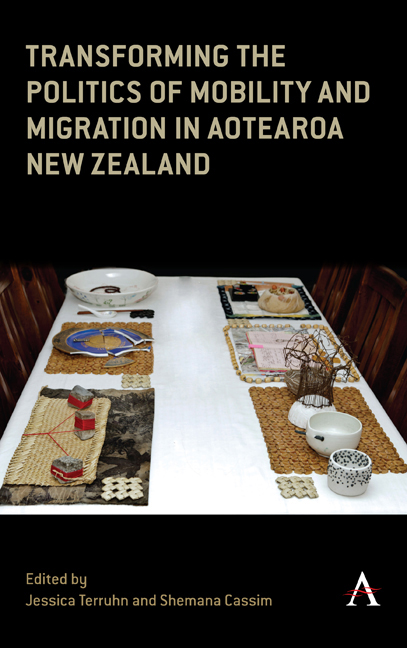Book contents
- Frontmatter
- Contents
- Acknowledgements
- Contributors
- Glossary of Te Reo Māori Words
- Glossary of Te Reo Māori Place Names
- Glossary of Other Non-English Words
- List of Tables
- List of Figures
- Introduction: Reimagining the Politics of Mobility and Migration Through Decolonisation, Social Justice and Solidarities
- Cover Artwork: A Place at the Kauri Table Revisited … 2021
- Part One Decolonising the Politics of Migration
- Part Two Humanising the Politics of Transnational Mobility
- Part Three Building Solidarities for Migrant Rights and Belonging
- Conclusion: Towards Transforming the Politics of Mobility and Migration in Aotearoa New Zealand
- Index
Commentary: Expensive Burdens: How Aotearoa New Zealand’s Immigration Policy Undermines Disabled People’s Human Rights and Ideas for Taking a More Equitable Approach
Published online by Cambridge University Press: 28 February 2024
- Frontmatter
- Contents
- Acknowledgements
- Contributors
- Glossary of Te Reo Māori Words
- Glossary of Te Reo Māori Place Names
- Glossary of Other Non-English Words
- List of Tables
- List of Figures
- Introduction: Reimagining the Politics of Mobility and Migration Through Decolonisation, Social Justice and Solidarities
- Cover Artwork: A Place at the Kauri Table Revisited … 2021
- Part One Decolonising the Politics of Migration
- Part Two Humanising the Politics of Transnational Mobility
- Part Three Building Solidarities for Migrant Rights and Belonging
- Conclusion: Towards Transforming the Politics of Mobility and Migration in Aotearoa New Zealand
- Index
Summary
Introduction
Aotearoa New Zealand (hereafter, Aotearoa) is a multicultural society, in which roughly one in four people are disabled (Statistics New Zealand 2014). The country is not unique in this regard, and yet globally, ‘migration theory grows without the disabled person, disability studies without the migrant, and practice without the disabled migrant’ (Pisani and Grech 2015, 421).
As Trotter (2012, 30) highlights, ‘Being a migrant affects the experience of being disabled but being disabled also alters the experience of migration.’ This is especially true when policies use medical or disability criteria to restrict entry, as is common among English-speaking settler colonial societies (Burns 2019; Gothard 2021), but in Aotearoa, scant attention has been paid to such intersecting experiences within migration or disability research.
We, the authors of this commentary, are four disabled immigrants to Aotearoa. In the context of te ao Māori (the Māori world) migration values and practices, and colonial immigration requirements, we lay out the country's current health and disability-related immigration settings, interrogating them in relation to domestic and international human rights law. We then highlight how Aotearoa's discriminatory immigration policy is reflected in our lived experiences. Next, we offer an alternative example, demonstrating how Canada's once similar immigration policy is taking steps towards abolishing the health criteria. In conclusion, we suggest a more equitable path forward for Aotearoa, grounded in a te ao Māori perspective.
Aotearoa's Health and Disability Immigration Policies
Prior to colonisation, protocols based on Māori customary laws and principles meant that internal migration within Aotearoa took place on a relational basis (Quince 2021). Newly arrived residents took on obligations and respected the tangata whenua (local people of the territory). By extension, Te Tiriti o Waitangi (The Treaty of Waitangi), the country's foundational document signed by Māori chiefs and the Crown, has since 1840 offered a blueprint for the relationships between Māori and settler people (Quince 2021). However, its principles have not been upheld by the settlers, with Pākehā (settlers of Anglo-European origin) governing administrations continually excluding te ao Māori perspectives from policy and legislation (Mikaere 2011).
In te ao Māori, disability is situated as a ‘collective endeavour of both the individual and the whānau (family) as a whole’ (Hickey and Wilson 2017, 87). This is because disability is understood in relation to the need for support with certain situations or actions that are necessary in life.
- Type
- Chapter
- Information
- Publisher: Anthem PressPrint publication year: 2023

